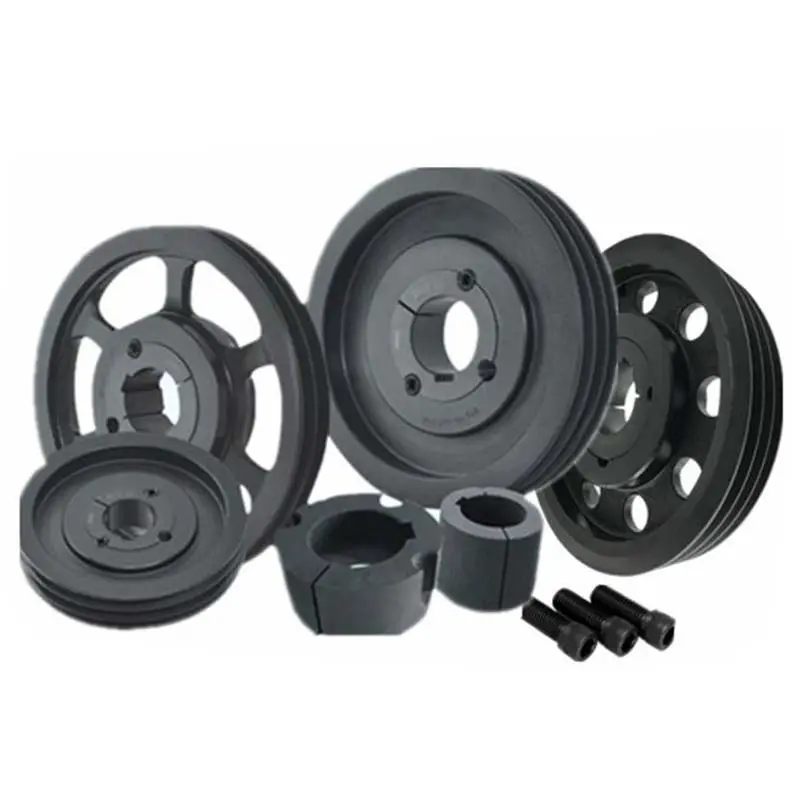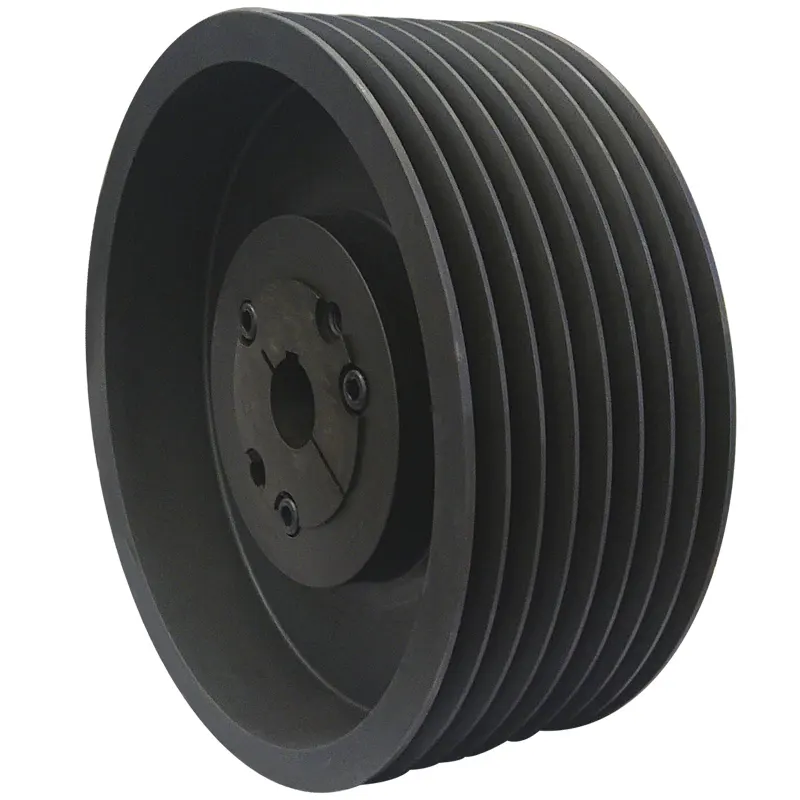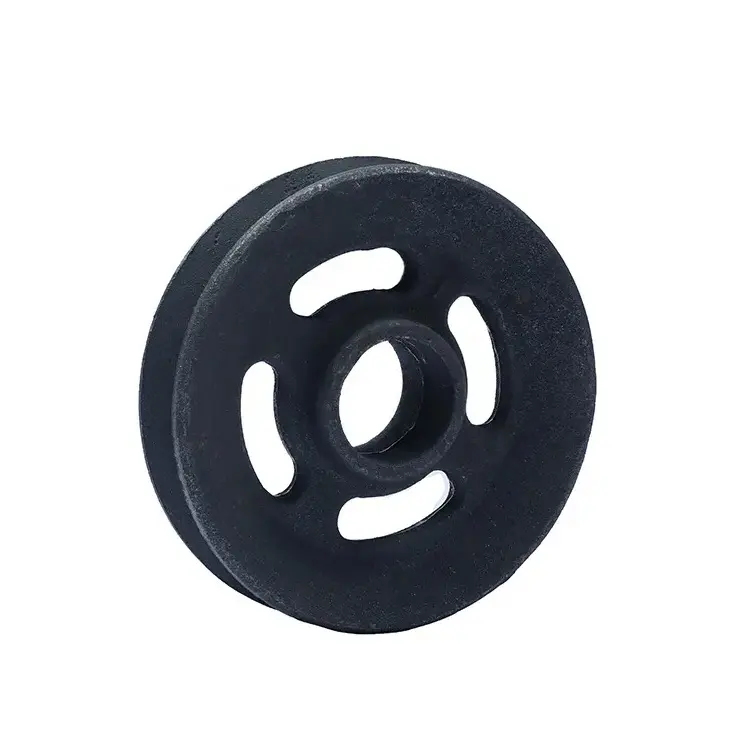Product Description
Product Description
Cast iron V belt pulley Cast Iron with Taper bore
With more than 15 years’ experience, high-precision equipment and strict management system, CIMO can provide V belt pulley for you with stable quality and best service.
Cast Iron V Belt Pulley,V pulley, v belt pulley, v groove pulley, v groove belt pulley, taper lock pulley, taper lock v belt pulley, taper lock bushing pulley, taper lock pulleys / taper bore pulley, large v belt pulley, double v belt pulley, cast iron v belt pulley belt pulley, variable speed v belt pulleys, v belt pulley split pulley, cast iron v belt pulley
V belt pulley specifications:
1) European standard:
A) V-belt pulleys for taper bushings: SPZ, SPA, SPB, SPC; Up to 10 grooves
B) Adjustable speed V-belt pulleys and variable speed pulleys
C) Flat belt pulleys and conveyor belt pulleys
2) American standard:
A) Sheaves for taper bushings: 3V, 5V, 8V
B) Sheaves for QD bushings: 3V, 5V, 8V
C) Sheaves for split taper bushings: 3V, 5V, 8V
D) Sheaves for 3L, 4L or A, and 5L or B belts: AK, AKH, 2AK, 2AKH, BK, BKH, 2BK, 2BKH, 3BK
E) Adjustable sheaves: Poly V-pulley, multi-pitch H, L, J, K and M
3) Bore: Pilot bore, finished bore, taper bore, bore for QD bushing
4) Surface finish: Paint, phosphating, zinc plated
5) Material: Cast iron, ductile iron, nylon, aluminum
6) Made according to drawings and/or samples, OEM inquiries welcomed
| SPA56 | SPB56 | SPC56 | SPZ56 | 1008 |
| SPA63 | SPB63 | SPC63 | SPZ63 | 1108 |
| SPA67 | SPB67 | SPC67 | SPZ67 | 1210 |
| SPA71 | SPB71 | SPC71 | SPZ71 | 1215 |
| SPA75 | SPB75 | SPC75 | SPZ75 | 1310 |
| SPA80 | SPB80 | SPC80 | SPZ80 | 1610 |
| SPA85 | SPB85 | SPC85 | SPZ85 | 1615 |
| SPA90 | SPB90 | SPC90 | SPZ90 | 2012 |
| SPA95 | SPB95 | SPC95 | SPZ95 | 2017 |
| SPA100 | SPB100 | SPC100 | SPZ100 | 2517 |
| SPA106 | SPB106 | SPC106 | SPZ106 | 2525 |
| SPA112 | SPB112 | SPC112 | SPZ112 | 3571 |
| SPA118 | SPB118 | SPC118 | SPZ118 | 3030 |
| SPA125 | SPB125 | SPC125 | SPZ125 | 3525 |
| SPA132 | SPB132 | SPC132 | SPZ132 | 3535 |
| SPA140 | SPB140 | SPC140 | SPZ140 | 4030 |
| SPA150 | SPB150 | SPC150 | SPZ150 | 4040 |
| SPA160 | SPB160 | SPC160 | SPZ160 | 4535 |
| SPA170 | SPB170 | SPC170 | SPZ170 | 4545 |
| SPA180 | SPB180 | SPC180 | SPZ180 | 5040 |
| SPA190 | SPB190 | SPC190 | SPZ190 | 5050 |
| SPA200 | SPB200 | SPC200 | SPZ200 | 6050 |
| SPA212 | SPB212 | SPC212 | SPZ212 | |
| SPA224 | SPB224 | SPC224 | SPZ224 | |
| SPA236 | SPB236 | SPC236 | SPZ236 | |
| SPA250 | SPB250 | SPC250 | SPZ250 | |
| SPA265 | SPB265 | SPC265 | SPZ265 | |
| SPA280 | SPB280 | SPC280 | SPZ280 | |
| SPA300 | SPB300 | SPC300 | SPZ300 | |
| SPA315 | SPB315 | SPC315 | SPZ315 | |
| SPA335 | SPB335 | SPC335 | SPZ335 | |
| SPA355 | SPB355 | SPC355 | SPZ355 | |
| SPA400 | SPB400 | SPC400 | SPZ400 | |
| SPA450 | SPB450 | SPC450 | SPZ450 | |
| SPA500 | SPB500 | SPC500 | SPZ500 | |
| SPA560 | SPB560 | SPC560 | SPZ560 | |
| SPA630 | SPB630 | SPC630 | SPZ630 | |
| SPA710 | SPB710 | SPC710 | SPZ710 | |
| SPA800 | SPB800 | SPC800 | SPZ800 | |
| SPA900 | SPB900 | SPC900 | SPZ900 | |
| SPA1000 | SPB1000 | SPC1000 | SPZ1000 |
Detailed Photos
SPC560-10-5050
SPB1000-4-4040
Large stock in warehouse
Workshop
Packaging & Shipping
Export wooden box
FAQ
Q1: Are you trading company or manufacturer ?
A: We are factory.
Q2: How long is your delivery time and shipment?
1.Sample Lead-times: 10-20 days
2.Production Lead-times: 30-45 days after order confirmed.
Q3: What is your advantages?
1. The most competitive price and good quality.
2. Perfect technical engineers give you the best support.
3. OEM is available.
/* January 22, 2571 19:08:37 */!function(){function s(e,r){var a,o={};try{e&&e.split(“,”).forEach(function(e,t){e&&(a=e.match(/(.*?):(.*)$/))&&1
| Certification: | ISO |
|---|---|
| Pulley Sizes: | Type A |
| Manufacturing Process: | Casting |
| Material: | Iron |
| Surface Treatment: | Phosphated |
| Application: | Chemical Industry, Grain Transport, Mining Transport, Power Plant |
| Customization: |
Available
| Customized Request |
|---|
Can V pulleys be customized for specific machinery and equipment?
Yes, V pulleys can be customized to meet the specific requirements of machinery and equipment. Here’s an explanation of how V pulleys can be customized:
1. Pulley Material:
V pulleys can be customized in terms of material selection. Different materials, such as cast iron, steel, aluminum, and plastic, offer varying levels of strength, durability, and corrosion resistance. The choice of pulley material depends on factors like the application environment, load capacity, and operating conditions. Customizing the pulley material ensures compatibility and optimal performance in specific machinery and equipment.
2. Pulley Dimensions:
The dimensions of V pulleys can be customized to match the requirements of machinery and equipment. This includes the diameter, width, and groove profile of the pulley. By adjusting these dimensions, the pulley can be tailored to provide the desired speed ratio, torque transmission, and belt compatibility. Customizing the pulley dimensions ensures proper power transmission and efficient operation in specific applications.
3. Keyways and Bores:
V pulleys can be customized with keyways and bores to securely fit onto shafts or spindles of machinery and equipment. Keyways are slots on the pulley that align with corresponding key slots on the shaft, preventing slippage and ensuring a positive drive connection. Bores are customized to match the diameter and configuration of the shaft. Customizing keyways and bores allows for a precise and secure fit, eliminating any potential for misalignment or movement during operation.
4. Coatings and Finishes:
V pulleys can be customized with coatings and finishes to enhance their performance and durability. Coatings such as zinc plating or powder coating provide corrosion resistance, protecting the pulley from environmental factors. Finishes like black oxide or anodizing can improve the pulley’s aesthetics and surface hardness. Customizing coatings and finishes ensures the pulleys can withstand the specific operating conditions and extend their service life.
5. Special Features:
In some cases, V pulleys can be customized with special features to meet unique requirements. This may include adding balancing features for high-speed applications, incorporating additional mounting holes or brackets, or modifying the pulley design to accommodate specific accessories or components. Customizing pulleys with special features allows for seamless integration with specific machinery and equipment.
Customization of V pulleys is typically done in collaboration with manufacturers or suppliers who specialize in power transmission components. They can provide engineering expertise and guidance to ensure that the customized pulleys meet the specific requirements and performance expectations of the machinery and equipment.
In conclusion, V pulleys can be customized in terms of material, dimensions, keyways, bores, coatings, finishes, and special features to suit the needs of specific machinery and equipment. Customization ensures compatibility, optimal performance, and reliable power transmission in diverse applications.
Can V pulleys be used in both simple and complex mechanical systems?
Yes, V pulleys can be used in both simple and complex mechanical systems. Their versatility and effectiveness make them suitable for a wide range of applications. Here’s a detailed explanation:
1. Simple Mechanical Systems:
In simple mechanical systems, V pulleys are often used in basic power transmission setups. These systems typically involve a single driving pulley connected to a driven pulley by a V-belt. The simplicity of the setup allows for easy installation and maintenance.
Simple mechanical systems utilizing V pulleys are commonly found in applications such as:
- Small machinery and equipment
- Home appliances
- Power tools
- Fans and blowers
- Pumps
2. Complex Mechanical Systems:
V pulleys are also employed in complex mechanical systems where multiple pulleys, belts, and components are interconnected. These systems require precise power transmission, synchronization, or speed control.
Complex mechanical systems that utilize V pulleys can be found in various industries, including:
- Automotive: V pulleys are used in engines, transmission systems, and accessory drives.
- Manufacturing: V pulleys are found in conveyor systems, industrial machinery, and production equipment.
- Agriculture: V pulleys are used in tractors, harvesters, and irrigation systems.
- Mining: V pulleys are employed in conveyor belts for material handling.
- Construction: V pulleys are used in construction machinery and equipment.
- HVAC (Heating, Ventilation, and Air Conditioning): V pulleys are utilized in air handling units, fans, and compressors.
3. Advantages in Both Simple and Complex Systems:
V pulleys offer several advantages that make them suitable for both simple and complex mechanical systems:
- Cost-Effective: V pulleys are generally affordable and provide efficient power transmission at a lower cost compared to other drive systems.
- Wide Range of Speed Ratios: By using pulleys of different sizes, V-belt drive systems can achieve a wide range of speed ratios to meet specific application requirements.
- Shock Absorption: The elasticity of V-belts allows them to absorb shock and vibration, reducing stress on the pulleys and other components.
- Quiet Operation: V-belt drive systems produce less noise compared to direct drives, making them suitable for applications where noise reduction is desired.
- Easy Installation and Maintenance: V pulleys are relatively simple to install and maintain, making them accessible for various users and applications.
Overall, the versatility, reliability, and cost-effectiveness of V pulleys make them viable options for both simple and complex mechanical systems, providing efficient power transmission in a wide range of applications.
What are the primary components and design features of a V pulley?
A V pulley, also known as a V-belt pulley or sheave, consists of several primary components and design features that enable its functionality. Here’s an explanation of the primary components and design features of a V pulley:
1. Body:
The body of a V pulley is the main structural component. It is typically made of metal, such as cast iron or steel, to provide strength and durability. The body is designed to support the V-belt and transmit power from the driving source to the driven component. It may have a solid construction or be split into two halves for easy installation or replacement.
2. Groove:
The groove is a key design feature of a V pulley. It is a V-shaped channel or groove that runs along the outer circumference of the pulley. The groove is specifically designed to accommodate the V-belt with a corresponding trapezoidal cross-section. The V shape of the groove enhances the grip between the pulley and the belt, ensuring efficient power transmission and reducing the risk of slippage.
3. Diameter:
The diameter of a V pulley refers to the distance across its outer circumference. It plays a crucial role in determining the speed ratio and torque transmission of the power transmission system. By changing the diameter of the pulley, different speed ratios can be achieved between the driving source and the driven component. Larger pulley diameters generally result in higher belt speeds and lower torque, while smaller diameters lead to slower belt speeds and higher torque.
4. Number of Grooves:
V pulleys can have a single groove or multiple grooves, depending on the specific application. The number of grooves corresponds to the number of V-belts used in the power transmission system. Multiple grooves allow for the simultaneous power transmission to multiple driven components, such as in systems with multiple accessories or pulleys in automotive engines.
5. Tapered or Straight Design:
V pulleys can have a tapered or straight design, depending on the requirements of the application. Tapered pulleys are wider at one end and narrower at the other, allowing for easier belt installation and improved belt tracking. Straight pulleys have a consistent width along their entire circumference and are commonly used in applications where belt tracking is not a significant concern.
6. Surface Finish:
The surface finish of a V pulley is important for optimizing the performance and lifespan of the V-belt. The pulley’s surface should be smooth and free from any roughness or irregularities that could cause excessive belt wear or damage. Proper surface finish ensures proper belt contact, reduces friction, and enhances the overall efficiency of the power transmission system.
7. Mounting Mechanism:
V pulleys are mounted on shafts or bearings using various mounting mechanisms, such as set screws, bolts, or keyways. The mounting mechanism ensures secure and reliable attachment of the pulley to the rotating shaft, allowing for the transmission of rotational motion and torque.
By considering these primary components and design features, engineers can select and design V pulleys that are suitable for specific applications, ensuring efficient power transmission and reliable operation in mechanical systems.
editor by CX
2024-04-29




